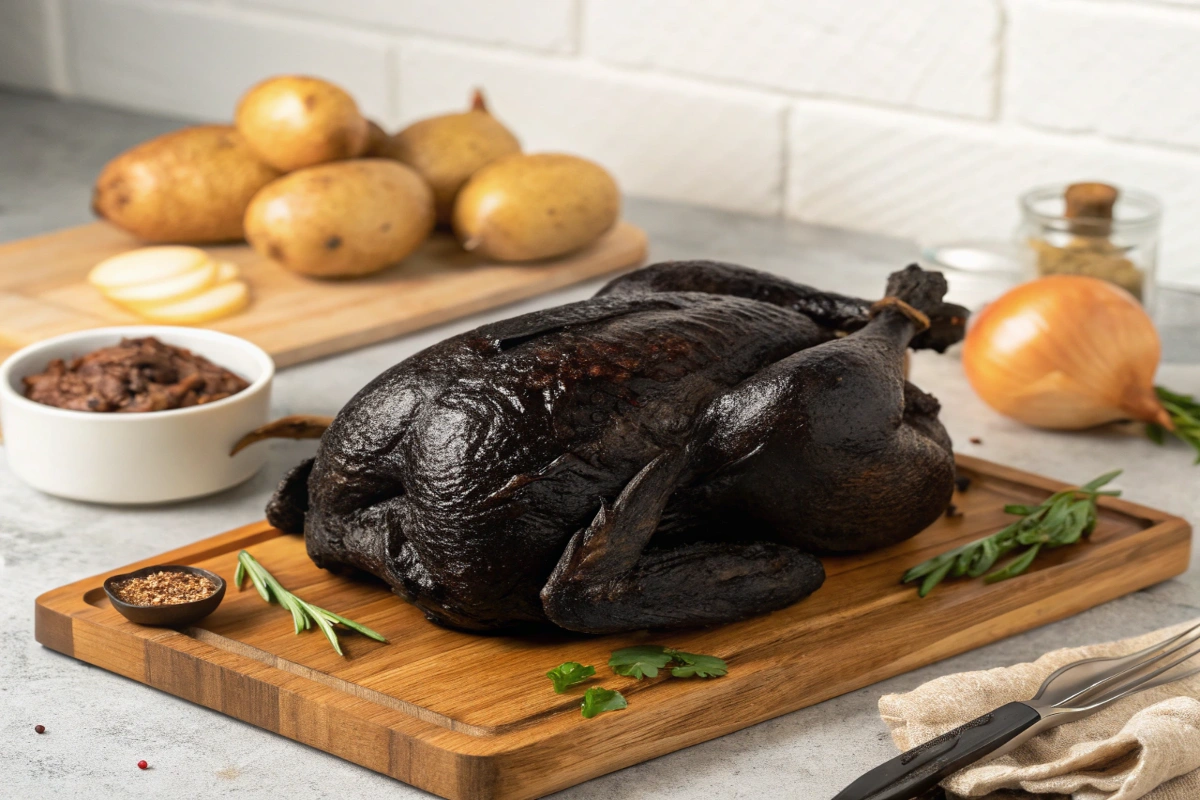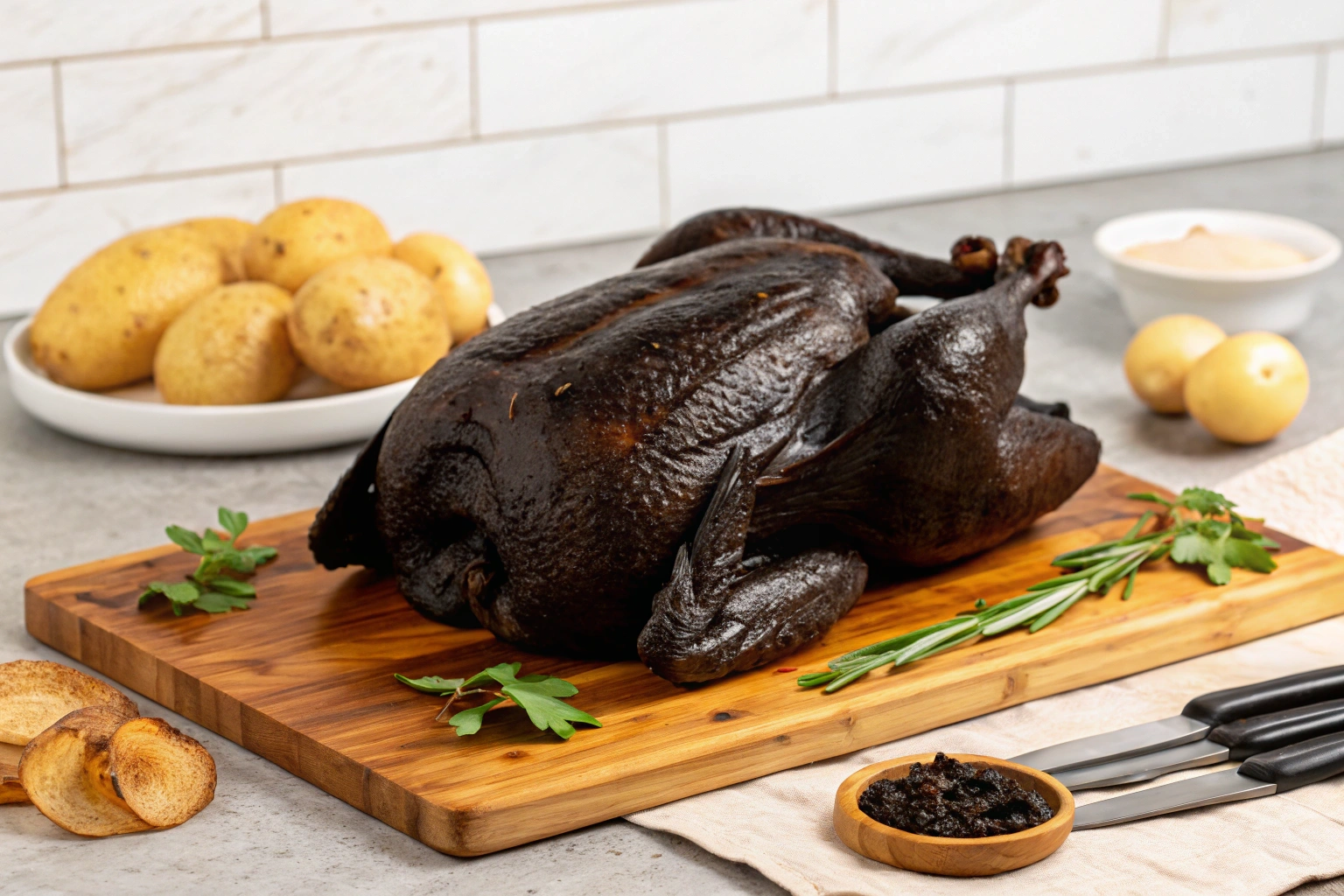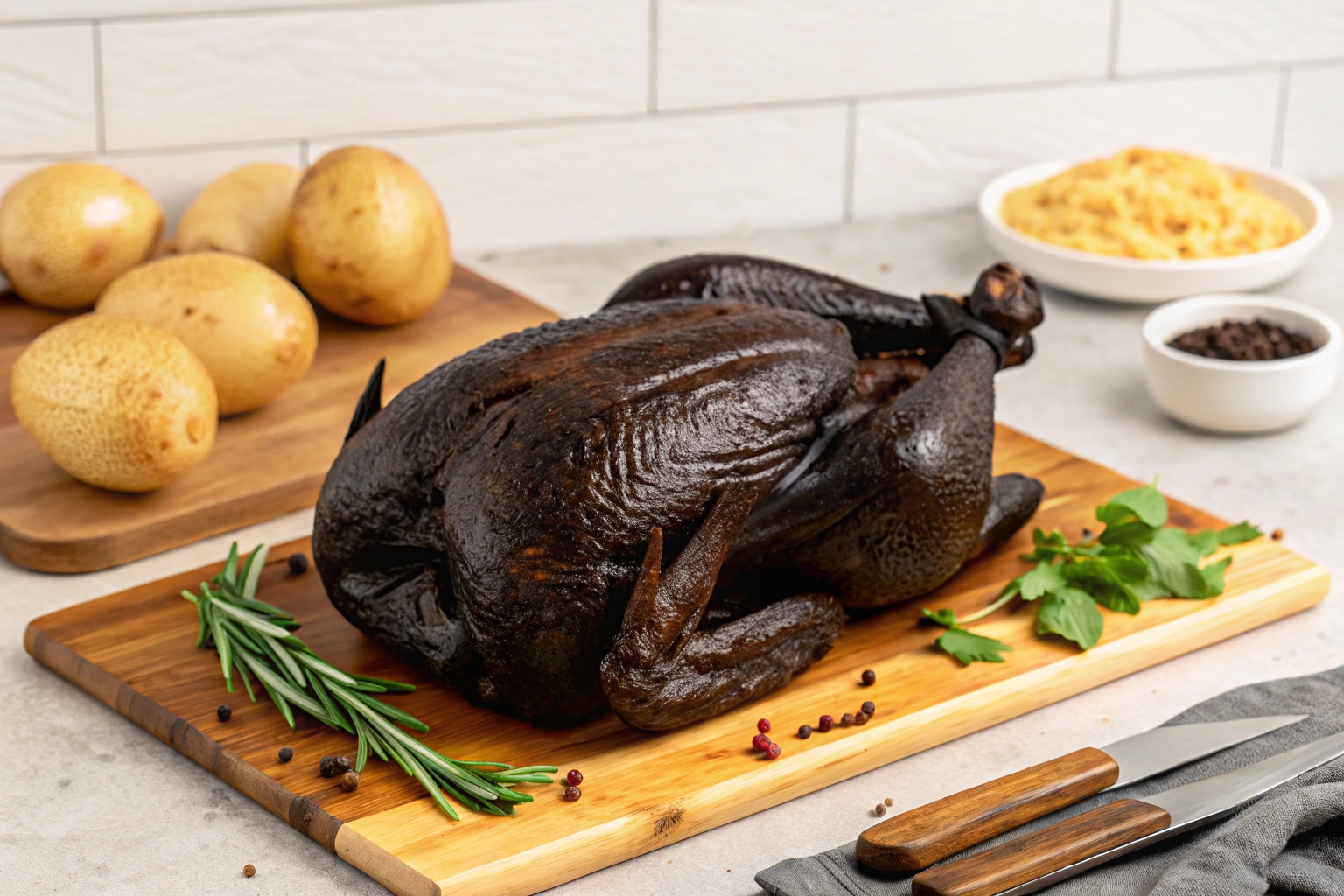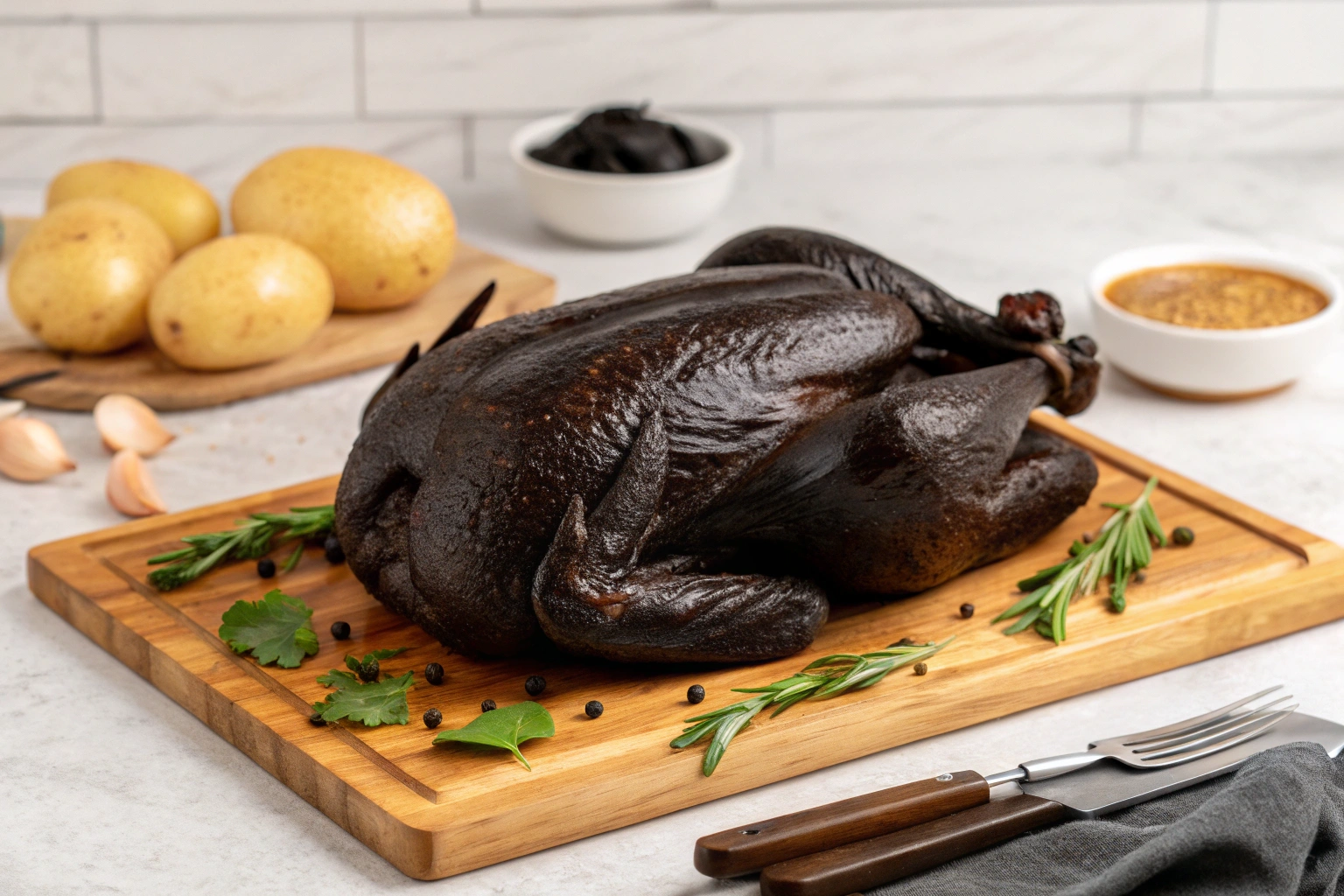Black chicken, a rare and fascinating poultry breed, has captivated cultures and culinary enthusiasts around the world for centuries. Known for its unique dark feathers, skin, and even internal organs, black chicken is not only visually striking but also holds deep cultural and spiritual significance. This rare chicken breed, including the renowned Ayam Cemani, has been revered for its symbolism of strength, mystery, and good fortune, making it a treasured animal in various traditions. In this article, we will explore the history, cultural importance, and culinary uses of black chicken, along with practical advice for raising these extraordinary birds.
What is Black Chicken?
Black chickens belong to a breed group characterized by dark-colored feathers, skin, and bones. The Ayam Cemani, native to Indonesia, stands as the most famous example. These chickens are not named solely for their color; their anatomy—from feathers to internal organs—exhibits a jet-black hue caused by a genetic mutation known as fibromelanosis. This unique feature sparks fascination worldwide.
The fibromelanosis gene not only gives black chickens their striking appearance but also enhances the texture and quality of their meat. Particularly in breeds like the Ayam Cemani, the meat displays a dark, almost black color, distinguishing it from common chicken breeds and attracting culinary enthusiasts.
Historical Significance of Blac Chicken
Black chickens boast a long, rich history intertwined with ancient cultures and rituals. Many societies revered these rare chickens as sacred or mystical animals. For instance, ancient Indonesians bred the Ayam Cemani and associated its dark features with strength, mystery, and spirituality.
In other parts of the world, people attributed protective qualities or mystical powers to these dark poultry. Rituals often included them as symbols to ward off evil spirits or invite good fortune. Their rarity and dark feathers made them revered creatures, frequently depicted in art, folklore, and religious texts.

Cultural Importance of Black
Chickens Across the Globe
Black chickens hold cultural significance in many regions. In Southeast Asia, particularly Indonesia, the Ayam Cemani represents pride and cultural identity. Local folklore frequently features this breed, and its rarity and high value elevate it to a status symbol. If you’re interested in exploring more exotic poultry, check out our Nestle Chocolate Chip Cookie Recipe for a touch of sweetness or Chicken Hearts: Nutritional Benefits and Culinary Uses for another unique culinary experience.
In African traditions, communities often included black chickens in ceremonies and as offerings in prayers or sacrifices. Many associated their dark color with ancestors, death, and the afterlife. These chickens embodied a spiritual connection, acting as intermediaries between the living and the spiritual realms. For a look at unique poultry dishes, try our Jamaican Blue Mountain Coffee or Chicken Shrimp Recipes.
In Western societies, dark poultry symbolizes luxury and exoticism. Their meat, regarded as a delicacy, attracts high demand, while their unique appearance and health benefits enhance their appeal. Learn more about diverse food trends and cultural dining with our Quick Healthy Lunch Ideas or Beef Sausage.
Physical Characteristics of Black Chicken Breeds
Dark chickens have a number of distinctive physical features that make them stand out from the rest of the poultry world. Their appearance is both elegant and mysterious, which adds to their allure.
Distinct Features of Ayam Cemani and Other Dark Poultry
The most obvious feature of black chickens is their black feathers, but this is just the start. These chickens exhibit a unique genetic trait known as fibromelanosis, which causes a variety of effects on their physical appearance. The trait results in not only black feathers but also dark skin, black bones, and dark internal organs.
One of the most striking features is the glossy, iridescent black feathers that shimmer in the light, often appearing greenish or bluish in certain lighting conditions. Their eyes are typically dark, sometimes appearing as though they are black pools. Additionally, dark chicken breeds tend to have a more compact body structure. compared to other breeds, making them look sleek and agile.

Understanding the Black Skin and Its Significance
The dark skin of these chickens is due to the same genetic mutation responsible for their black feathers. Fibromelanosis influences the production of melanin, the pigment that gives color to feathers, skin, and internal tissues. This pigment is more concentrated in black poultry, resulting in the deep, dark color that extends to all parts of their body.
In many cultures, the dark skin of these rare chickens has been seen as a symbol of mystery, power, and even good health. Some traditional medicine systems, particularly in Southeast Asia, attribute various health benefits to the consumption of dark poultry, believing that its dark skin contains essential nutrients and healing properties.
Comparing Rare Chickens to Other Poultry Breeds
While most chicken breeds have light-colored feathers and pale skin, black chickens stand out due to their unique pigmentation. Their most famous counterpart, the Ayam Cemani, is often compared to other breeds like the Rhode Island Red or the White Leghorn. The major difference lies not only in their color but also in the texture and quality of the meat.
Dark chickens tend to have leaner meat with a richer flavor profile compared to the more common white chicken breeds. This makes dark poultry a prized ingredient in various culinary traditions, particularly for its tender texture and unique taste.
Notable Black Chicken Breeds
While Ayam Cemani is the most well-known breed, other notable dark poultry breeds share similar physical traits and cultural significance.
Ayam Cemani: The Most Famous Dark Poultry Breed
The Ayam Cemani is perhaps the most famous dark chicken breed, known for its entirely black feathers, skin, and even internal organs. Hailing from Indonesia, this breed is often regarded as the “Lamborghini of poultry” due to its rarity and high price. The Ayam Cemani is used in ceremonial rituals and is highly valued for its uniqueness and supposed mystical properties. Its meat is prized not only for its appearance but also for its taste, which is richer and more intense than regular chicken meat.
Other Notable Dark Poultry Varieties
Other black chicken breeds include the Silkie and the Kadaknath. The Silkie, though not entirely black, has dark skin and black bones. Its feathers are soft and fluffy, giving it a distinct look that sets it apart from other breeds. The Kadaknath, a breed native to India, shares the characteristic dark skin and is known for its unique meat. for its high nutritional value and medicinal properties.
Traditional Recipes Featuring Black Chicken
Black chicken, celebrated for its rich flavor and tender meat, plays a significant role in traditional cuisine. Across various cultures, people have integrated this unique poultry into their diets, especially in soups, stews, and roasted dishes. These recipes not only showcase the meat’s distinctive taste but also highlight its cultural importance. Some of the most popular traditional recipes include:
- Ayam Penyet: This spicy Indonesian dish features black chicken smashed and served with sambal (chili paste) alongside rice. Consequently, it has become a favorite for those who enjoy bold, fiery flavors.
- Black Chicken Soup: A staple in Chinese cuisine, this nutrient-dense soup combines black chicken with herbs and medicinal ingredients, which are believed to enhance health and vitality. As a result, it is often prepared for those recovering from illness.
- Roast Black Chicken: By slow-roasting black chicken with aromatic herbs and spices, cooks bring out its natural flavors, making it a perfect centerpiece for family meals. Additionally, this method allows the meat’s unique qualities to shine.
Modern Cooking Methods for this kind of Chicken
Modern cooking techniques have transformed how chefs use black chicken in contemporary dishes, emphasizing its adaptability and nutritional benefits. Consequently, these innovative methods bring out the best in this unique meat. Some popular techniques include:
- Sous-Vide: Cooking black chicken in a water bath at a controlled temperature ensures unparalleled tenderness and rich, concentrated flavors. Therefore, this method is a favorite among professional chefs.
- Grilling or Barbecuing: By marinating the chicken with a mix of herbs and spices before grilling, chefs add smoky aromas and create a crisp exterior. Moreover, this technique enhances the overall flavor profile.
- Stir-Frying: This quick and healthy method combines black chicken with vibrant vegetables and flavorful sauces, creating a nutritious meal that suits a busy lifestyle. Furthermore, it retains the chicken’s natural juices and nutrients.

Black Chicken in Popular Culture
Its Role in Myths and Legends
Throughout history, black chicken has been surrounded by mystery and symbolism. In many cultures, people associate it with power, mystique, or supernatural qualities. For instance:
- In certain societies, black chicken is thought to ward off evil spirits or attract good fortune.
- Additionally, African and Caribbean folklore often incorporates black chicken in rituals aimed at spiritual protection or connecting with ancestral spirits.
In Popular Media
Black chicken frequently appears in popular media, where its rarity and striking appearance make it a symbol of luxury or mystery. For example, it is often featured in films, books, and culinary shows to represent opulence or uniqueness. Consequently, these portrayals contribute to its exotic reputation.
Symbolism in Various Cultures
Black chicken carries different meanings across cultures, reflecting its unique characteristics and cultural associations.
In certain Asian traditions, black chicken represents good luck and prosperity. Furthermore, it is often featured in celebratory meals. For example, try our Jamaican Blue Mountain Coffee to complement a special occasion or Chicken and Peppers Recipe for a flavorful dish.
In contrast, ancient Egyptians associated its black feathers with the mysterious forces of the underworld, linking it to death and rebirth cycles.
Spiritual and Superstitious Associations
Black chicken holds spiritual significance in many traditions:
In African rituals, it connects practitioners to their ancestors, fostering a sense of spiritual guidance. Moreover, it is often used to seek blessings. If you’re interested in exploring the cultural value of different foods, check out our Healthy Cottage Cheese Recipes or our Quick Dinner Ideas for 2.
Similarly, European folklore portrays black chickens as protectors against evil spirits, associating their dark coloration with strength and resilience.
How to Raise Black Chicken
Ideal Conditions for Raising Black Chicken
Black chickens require specific conditions to thrive and remain healthy. To ensure optimal growth:
- Provide Adequate Space: These active and curious birds need plenty of room to roam and forage. Consequently, they tend to stay healthier in open environments. For more about healthy living, check out Quick Healthy Lunch Ideas.
- Build Secure Shelter: A dry, well-ventilated coop protects them from harsh weather while ensuring their comfort. Additionally, good shelter reduces stress, which benefits their health.
- Maintain Cleanliness: Regularly cleaning the coop prevents diseases and promotes overall well-being. Moreover, a clean environment encourages better egg production.
Feeding and Caring for these Chickens
Proper nutrition and care are essential for keeping black chickens healthy and productive. To meet their dietary needs:
- Feed them a balanced diet rich in protein, vitamins, and minerals. As a result, they develop strong bones and produce high-quality eggs. Try our Beef Sausage for a protein-packed dish!
- Ensure they have constant access to fresh, clean water. Additionally, occasional supplements like calcium can further enhance their health.
Raising Black Chickens in Different Climates
Raising black chickens in varied climates presents unique challenges. However, thoughtful adjustments can ensure their well-being:
- In hot climates, provide ample shade and hydration to prevent heat stress. As a result, the chickens remain comfortable and productive.
- In colder regions, use extra insulation in the coop and ensure access to warmth during freezing temperatures. Consequently, this helps maintain their health through harsh winters. For tips on preparing hearty meals, check out our Lipton Onion Soup Meatloaf Recipe.
- Regardless of the climate, always shield them from heavy rainfall and strong winds. This extra care contributes to their overall longevity.
Black Chicken and Sustainability
Raising black chickens promotes sustainability due to their adaptability and minimal resource requirements. These birds fit seamlessly into organic or small-scale farming systems. They contribute to biodiversity and help reduce reliance on industrial poultry farming, which often harms the environment. Their hardiness makes them a viable option for eco-conscious farmers who want to promote healthier food systems. This eco-friendly approach not only protects the environment but also supports sustainable food production.
Eco-Friendly Farming Practices for Black Chicken
Farming black chickens in an eco-friendly way benefits both the environment and the chickens. Here are some effective practices:
- Free-Range Farming: Farmers allow black chickens to roam freely in natural surroundings, reducing the need for industrial farming methods.
- Minimizing Waste: Black chickens consume organic waste on farms, reducing reliance on chemical fertilizers and assisting with waste management.
- Local Feed Use: Using locally sourced feed lowers transportation costs and reduces environmental impact.
Black Chicken and Organic Farming
Black chickens thrive in organic farming systems that avoid harmful chemicals and pesticides. Raised on natural feed in environments that support biodiversity, these chickens benefit both the environment and consumers who seek healthier, ethically raised poultry. Organic black chicken farming fosters a balanced ecosystem and delivers premium-quality products.
Ethical Considerations
Sustainability and the Ethics of Raising Black Chicken
Ethical farming emphasizes sustainability and humane treatment for black chickens. Here are the key aspects:
- Adequate Space and Natural Behavior: Black chickens need enough space to roam and engage in natural behaviors. Free-range or pasture-based systems are ideal.
- Focus on Animal Welfare: Ethical practices ensure that chickens live in clean, safe environments without suffering.
- Eco-Conscious Methods: Sustainable farming practices minimize environmental harm, aligning with ethical principles.

Economic Value
Black Chicken as a Luxury Food Item
Black chicken is considered a luxury food item due to its rarity and unique qualities. Restaurants and gourmet markets frequently feature black chicken for its rich flavor and high nutritional value. Its distinct black coloration and association with traditional dishes enhance its appeal to food connoisseurs.
Global Trade and Economic Impact
Black chicken farming has grown in popularity in international markets. Farmers and exporters benefit from the high demand, especially in niche and gourmet markets where the bird’s rarity and unique qualities are highly valued. Local economies also thrive as black chicken farming creates jobs, encourages entrepreneurship, and stimulates trade. Furthermore, exporting black chickens has become profitable for many, particularly in regions where rural development initiatives focus on sustainable agriculture. Black chicken farming has thus become both an economic driver and a tool for community development.
Black Chicken in the Future
Trends in Dark Poultry Farming
The dark poultry farming industry continues to evolve to meet changing consumer demands. Farmers now adopt sustainable and innovative farming methods to improve quality and productivity. They use advanced breeding techniques, environmentally friendly practices, and technologies to optimize feed and water use. Consumers’ growing interest in rare poultry breeds also boosts the popularity of dark chickens, both as culinary delicacies and valuable farming investments. This trend indicates a promising future for the industry, as it aligns with preferences for exotic and high-quality food options.
Innovations and Future Prospects
Technological and scientific advancements are shaping the future of dark chicken farming. Farmers are now using innovations such as automated feeding systems and climate-controlled coops, making it more efficient to raise dark poultry. Researchers are developing disease-resistant breeds to reduce losses and increase production. As interest in sustainable and ethically raised poultry continues to grow, dark chicken farming benefits from increased attention and advancements. These developments suggest that the sector will remain dynamic and profitable in agriculture.
Frequently Asked Questions (FAQs)
What makes black chicken unique compared to other breeds?
Black chicken stands out due to its black feathers, skin, and even internal organs. A rare genetic mutation causes this striking appearance, making it highly appealing. Additionally, its tender meat and nutritional benefits further distinguish it from other breeds.
Can black chicken meat improve health?
Yes, black chicken meat offers high nutritional value and can improve health. It provides an abundance of protein, vitamins, and minerals, making it a nutritious choice for various diets.
How do you prepare black chicken in cooking?
You can prepare black chicken in many ways to showcase its versatility. Popular methods include roasting, grilling, and slow-cooking in soups or stews. Signature dishes like black chicken soup and Ayam Penyet highlight its unique flavor.
Is black chicken more expensive than regular chicken?
Black chicken generally costs more due to its rarity and specialized care requirements. High-demand breeds like Ayam Cemani are particularly expensive, often regarded as delicacies.
Are there any cultural beliefs associated with black chicken?
Yes, many cultures associate black chicken with good fortune, health, and spiritual protection. It frequently appears in rituals and ceremonies because of its symbolic significance.
What is the lifespan of a black chicken?
Black chickens typically live 6 to 8 years, similar to other breeds. Proper care, including a balanced diet and a safe living environment, can help extend their lifespan further.
Conclusion
Black chicken is not just a culinary delicacy; it’s a symbol of mystery, culture, and health. From its rich history in ancient rituals to its nutritional benefits and unique flavor, this extraordinary bird has captured the hearts of chefs, health enthusiasts, and culture lovers alike. Whether you’re intrigued by its exotic appeal, its health-boosting properties, or its cultural significance, black chicken offers something special for everyone.
Now that you’ve learned about the wonders of black chicken, why not bring a piece of this fascinating tradition into your own kitchen? Explore the world of black chicken recipes, or consider raising your own flock to experience firsthand the beauty and benefits of this unique breed. Don’t miss out—embark on your black chicken journey today and discover all the ways this rare poultry can elevate your meals and your life!


4 thoughts on “Unlocking the Secrets of Black Chicken: A Fascinating Delicacy”